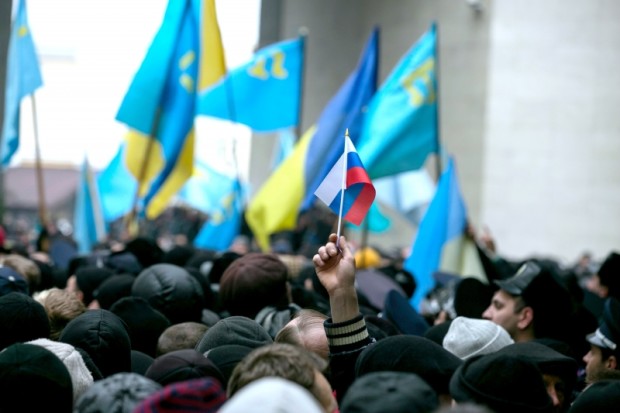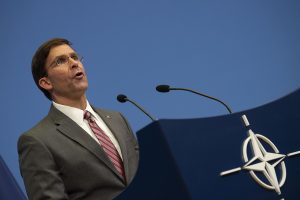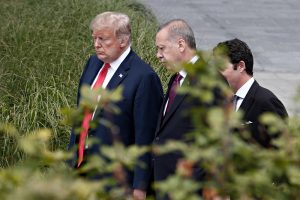by Derek Davison
This Monday marked the end of a five-day conference (May 15-19) in Kiev, called “Ukraine: Thinking Together,” organized by The New Republic and specifically its literary editor, Leon Wieseltier. The conference press release promised that “an international group of intellectuals will come to Kiev to meet Ukrainian counterparts, demonstrate solidarity, and carry out a public discussion about the meaning of Ukrainian pluralism for the future of Europe, Russia, and the world.” However, Wieseltier’s remarks at the conference, delivered on May 17, focused very little on “Ukrainian pluralism” and instead painted a picture of a crisis that bears little resemblance to what we actually know about the situation in Ukraine.
Wieseltier should be familiar to anyone who has been paying attention to the neoconservative policy world. Despite being considered a liberal thinker, he has worked on behalf of the Project for a New American Century (PNAC) and its offshoot, the Committee for the Liberation of Iraq (CLI), as well as continues to be affiliated with PNAC’s successor, the Foreign Policy Initiative (FPI). FPI has written many letters, all including Wieseltier’s signature, to prominent DC politicians, endorsing a litany of neocon policy goals: military intervention in Syria, increased hostility toward Iran, and belligerence toward Russia. Wieseltier himself insists that he is not a neocon, and former LobeLog contributor Ali Gharib once declared him a “liberal neocon enabler and booster” rather than a neocon in his own right. This may be a distinction without much of a difference.
During his remarks in Kiev, Wieseltier began by placing his feelings on the situation in Ukraine in the context of his “somewhat facile but nonetheless sincere regret at having been born too late to participate in the struggle of Western intellectuals, some of whom became my teachers and my heroes, against the Stalinist assault on democracy in Europe.” That desire seems to have motivated Wieseltier to concoct a new narrative of recent events that papers over the very real internal struggle going on among the Ukrainians themselves, in order to make the crisis entirely about Russian aggression. He concedes that “Putin is not Stalin,” at least, and no one could challenge his assertion that “Putin is bad enough,” but Wieseltier was still trading in half-truths through much of his speech.
For starters, Wieseltier opines that “[t]he Ukrainian desire to affiliate with the West, its unintimidated preference for Europe over Russia, is not merely a strategic and economic choice; it is also a moral choice, a philosophical choice, a societal decision about ideals, a defiance of power in the name of justice, a stirring aspiration to build a society and a state that is representative of some values and not others.” This assumes facts not in evidence — specifically, of a “Ukrainian desire to affiliate with the West.” According to polling data, prior to Crimea’s secession in March, when Ukrainians were asked which economic union their country should join if it could only join one, support for joining the European Union never polled higher than a slim plurality of Ukrainian citizens. A Gallup poll taken in June-July 2013 found that more Ukrainians saw NATO as a “threat” than as “protection” (a plurality chose “neither”). Predictably, Ukrainians in the country’s east have been more likely to have a negative view of NATO and the EU than Ukrainians in the west.
Even now, after Crimea’s secession and the implied threats of a Russian invasion, only 43% of Ukrainians want stronger relations with the EU to the exclusion of stronger relations with Russia, and only 45% of Ukrainians have a positive view of the EU’s influence on Ukraine. These are both pluralities, yes, but they hardly speak to some universal “Ukrainian desire to affiliate with the West.” In fact, there is evidence to suggest that recent polling that indicates growing support for joining the EU reflects the Ukrainians’ response to what they see as Russian aggression and does not necessarily involve any abiding Ukrainian desire to join the West.
Wieseltier talks about four principles that guide the Ukrainian “revolution”: liberty, truth, pluralism, and moral accountability, but in each case his remarks obscure what is really happening in Ukraine. He talks about liberty, “the right of individuals and nations to determine their own destinies and their own way of life,” but ignores the fact that, for many Crimeans and Russian speakers in eastern Ukraine, the Euromaidan protests that ousted former President Viktor Yanukovych took away their rights, as individuals, “to determine their own destinies.” This was not a democratic or electoral transfer of power; it was a coup against what was by all accounts a legitimately elected government. Weiseltier seems unconcerned that Ukraine’s revolution effectively disenfranchised vast numbers of Ukrainian citizens by short circuiting their electoral process. He also criticizes Russian propaganda that calls the Kiev government “fascist” without acknowledging that there are fascist or soft fascist elements involved with Euromaidan who have been given a significant role in the government.
But it is on the principle of “pluralism” where Wieseltier is most confounding. He says that “[t]he crisis in the Ukraine is testing the proposition that people who speak different languages can live together in a single polity. That proposition is one of the great accomplishments of modern liberalism. Putin repudiates it.” But Putin’s geopolitics aside, it was, in fact, the new Ukrainian parliament installed by Euromaidan that initially repudiated that proposition; its very first act was a repeal (passed but not signed into law) of a 2012 law that allowed regional languages to attain semi-official status in parts of Ukraine with sizable non-Ukrainian populations. The impact of this action in terms of stoking the fears of Ukraine’s Russian population about the intentions of the new government probably can’t be overstated.
It seems clear that, as Jim Sleeper writes, Wieseltier has “learned nothing from his moral posturing on Iraq.” As he and his colleagues in PNAC and the CLI did a decade ago, Wieseltier is still using the language of principle and moral absolutes to mask reality and support the desire for a more muscular American foreign policy.






“…and instead painted a picture of a crisis that bears little resemblance to what we actually know about the situation in Ukraine.”
That’s what these neo-cons do. Or more accurately, that’s what they’re paid to do. Who foots the bill for these conferences? How much are participants getting paid to show up?
The “separatists” in east Ukraine could very well borrow a slogan from another group of rabble rousers who were dumping tea in Boston Harbor around 1776. “No taxation without representation.”
Whether by design or not, the Neocons are running the show, “O” will be blamed for what ever blows up, so the answer to who’s paying the bills for the neocons to do and write all this cold war crap, delusional as well as out of print, is the right wing extremists in this country, the ones who want to control the world. When have they ever gotten anything right, that ended up as a benefit to which ever country the policy was implemented?
” sincere regret at having been born too late to participate in the struggle of Western intellectuals, some of whom became my teachers and my heroes, against the Stalinist assault on democracy in Europe.””
maybe an off hand remark but a stupid attitude. there are different struggles today. the people who were invlved in that struggle then wouldn’t still be doing it I doubt